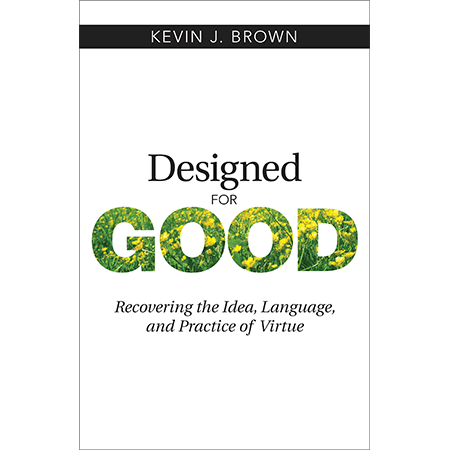Dr. Kevin J. Brown’s Designed for Good is a study of classical virtue ethics from a Christian perspective. This book shows Christians that their faith contains resources to help them recover the idea of virtue in the face of our modern moral bewilderment.
- Quote: “A reaction that is intuitive is based on what one feels to be true without conscious reasoning.” (20)
- Quote: “The Christian narrative suggests that our moral judgements need not be random emotional reactions, but rather, reflect an order that exists outside of us.” (23)
- Quote: “Be perfect (teleioi, purpose or end), as your Father in Heaven is perfect. (Mat. 5:48) … Jesus is not telling us to be faultless. He is telling us to be complete.” (25-26)
- Summary: Emotions help us to make decisions, but they do not necessarily help us discern the truth about what we should do. We were designed — designated — to do something, to be something good. What we desire to do should reflect the Creator and his order; we should desire to be moral. What we do, being moral, aligns with what we were meant to do, experience wholeness or holiness. To be perfect as our Father is perfect is to be a human being complete; you can imagine Jesus saying, “Be the best version of yourself.”
- Quote: “The ethical rightness or wrongness of an action is based solely on the utility (or the pleasure) that action produces.” (41-42)
- Quote: “Government should not affirm, through its policies or laws, any particular conception of the good life; instead it should provide a neutral framework of equal rights within which people can choose their own values and ends.” (54)
- Quote: “Christ did not die so I could do what I want; he died so I could do what is right.” (59)
- Summary: The best action to make is the one that produces the greatest amount of good for the greatest number of people. Legality can point one towards virtue but it can not make someone virtuous. Allowing a little bit of sin for a lot of good is not a popular belief in Christian faith. Determining what is right to do depends on what is good for humanity. “The good life” is to be determined by that individual, it can not be decided for a person. Being the best versions of ourselves requires us to acknowledge that life was meant to be lived a certain way. Our moral vision is guided by three influencers (the E-3 Paradigm): efficiency, equity, and enforceability.
- Quote: “Economists point out that our individual preferences reflect our capacity to confer value upon goods. Something’s value is subject to a individual appraisal.” (74)
- Quote: “Goodness is not something we generate or define on our own; it is something we apprehend. Goodness is outside of us, a thing to be perceived, grasped, and embodied. Goodness is not created, it is joined.” (86-87)
- Summary: Satisfaction is an important goal for human beings; therefore, our preferences become important too. This is called “preference satisfaction,” a belief that people know what will make them happy so they should consume it in whatever way necessary. When we become in sync with the order we discover the best version of ourselves. Thus, we find the idea of virtue.
- Quote: “A social good is something that serves a beneficial purpose for society.” (103)
- Quote: “What is valuable is not always the same as what is useful.” (108)
- Summary: Virtue is not something that can be labeled with a price. Our language should reflect the belief, and some beliefs are better than others. We live in a word where people hunger for meaning but they don’t know what to ask, the right vocabulary to use, or the right place to look for these answers they long for.
- Quote: Tim Keller, “Micah 6:8 is a summary of how God wants us to live[:] … act justly and love mercy and walk humbly with your God.” (128)
- Quote: “Autonomy values freedom and liberty from others, but virtue extols freedom for the sake of others.” (142)
- Summary: Personhood plays a significant role in motivating behaviors. We become what we repeatedly do. Gods wants justice and mercy together, and when the two are combined they make charity. Practicing justice and mercy looks a lot like generosity, charitable judgement, and steadfast love. Walking humbly with God is the opposite of the notion of autonomy. Autonomy is inadequate. Instead, walking humbly is found in humility and wisdom, to confess that we don’t have it all figured out and that we must rely on God. God has shown us what virtue looks like; he is love.
- Quote: “There are three relevant forms of empowerment that must come through God alone: harmony with ourselves, harmony with others, and harmony with God.” (160-161)
- Quote: “Humans have a relational blueprint. However, our fallen nature has polluted our relational capacity, leaving us to objective or perceive them as threats.” (169-170)
- Summary: One important part of being human is to be in communion with God and others. From the beginning, in the original form of the earth, we were designed to be in communion with others — that’s how it was intended.
- Quote: “Whether it is life quality, reciprocity, desirable outcomes, or simply avoiding punishment, we often find ourselves compelled to adopt a posture of virtue and moral integrity for pragmatic reasons.” (187)
- Quote: “Human existence is deliberate: individuals exist through the creative and communal expression of God.” (194)
- Summary: There are three rationales for why we should be moral: goodness works, divine command theory, and theological morality. Many seek to be moral and do good because there is a sense of fairness in the idea of “give a little, get a little.” These virtuous actions are not charity, but instead are formed on a base of karma. Others rely less on the outcomes and more on following orders from a divine lawgiver. Virtue begins with order and ends with a reflection toward God.

